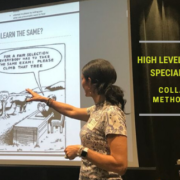Study Tips for High School High Achievers

For students who have previously excelled in school without exerting much effort, the idea of an intense study session may seem not only foreign, but also intimidating. While these students have grown accustomed to acing assessments, memorizing concepts, and tackling tasks with ease, they may have inadvertently neglected to acquire an essential academic tool—effective study skills.
For gifted students, those who have naturally acquired, implemented, and stockpiled knowledge and content in their classes from previous years, difficult concepts or the sudden need to study in order to retain information can be jarring and frustrating. For these students, school has come easily until now—which means that honed study skills and strategies might be outside of their repertoire.
What can be done for these naturally-gifted secondary students, those who oppose studying out of stubbornness, unfamiliarity, or sheer confusion? Plenty.
1) Start small with a rough outline of the essential material. For instance, if a high-achieving student in an AP history class is struggling to study for the first time, suggest that she create a realistic timeline for preparing for the assessment. A student who has never had to study is more likely to attempt a cramming strategy—or, non-strategy, if we are being honest. The added stress and lethargy from a long night of cramming before an exam can actually negatively impact the test-taker. As early as possible before an exam, high schoolers should attempt to roughly map out a study schedule that provides them with at least 3-5 days of advanced preparation.
The simple sample outline below for our AP history student could act as a starting point for those students that have never had to make an outline before:
| Monday | Tuesday | Wednesday | |
| Topic/Concept | WWII Key Players | Dates | Vocab |
| Actions | -Review map
-Chart Germany’s battles/progress -Assign 1 key point for each significant historical person |
-Make 2nd copy of blank timeline; try to complete from memory
-Highlight most significant dates during the Holocaust |
-Define unfamiliar terms from class notes/text
-Use new terms 2x per day until exam |
| Reminders | Look closely at Allied nations | Review date/location of start and end of WWII | Ask peer to compare to find additional terms |
2) If the basic outline above is a challenge for your novice studier, encourage her to find reputable online sources or videos that walk students through the process of making a study guide or outline. Often times, knowing where and how to begin can be the most intimidating part of studying for students who have had information retention come naturally for so long. By watching how other successful, experienced studiers compose an outline or gather information for a study guide, reluctant studiers then have a step-by-step resource to help walk them through the process. This is especially nice for parents if high school aged students are vehemently opposed to “doing it Mom or Dad’s way.”
3) Encourage novice studiers to “take small bites at first, then go back for more later.” This principle helps to reinforce memory and recall. If students cram or spend minimal time trying to memorize a concept, they will likely lose vital details prior to the assessment. Instead, once students feel that they have mastered or internalized a concept, prompt them to revisit that concept a few hours later or the following day. This will help high schoolers to understand if the material has been moved from short-term memory to long-term memory.
4) Ask your high school student to “teach” the material to another person. One long-standing concept about learning is the fact that mastery comes when one is able to teach or relay the information to another person. In this sense, students are not only confident in their ability to remember the info, but they take it a step further to explain or translate the information in their own words. Encourage your child to not only review definitions, for example, but come up with his own new definitions. This way, your high schooler will know for sure if he or she fully conceptualizes the term and its meaning.








